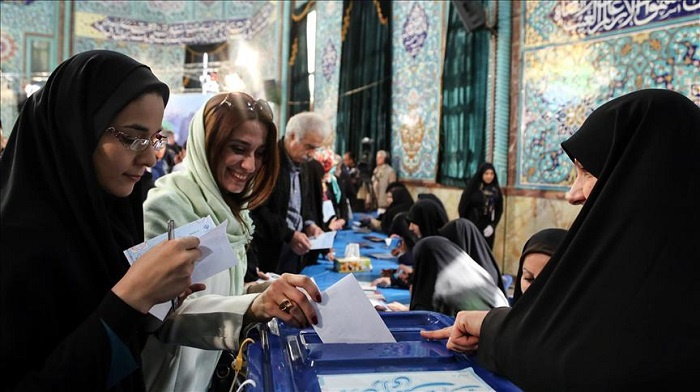Less Than Six Months Before Iran’s Presidential Election, a Deafening Silence Prevails

Moderate Principlist website Tabnak suggests that almost all parties, moderate, pro-reform or conservative, remain idly passive regarding the elections that will be held on May 19, 2017.
The day will see Iran’s twelfth presidential race, fifth city and village councils’ election, as well as the tenth mid-term parliamentary election. Partisan figures on both sides of Iran’s political spectrum have called for a move toward a partisan system that could guarantee accountability. As Tabnak has noted in an article published on Thursday, of hundreds of parties authorized by the Interior Ministry, only a few have the characteristics of real nationwide parties. Others, labeled ‘seasonal parties’, mushroom just before elections and are content to back their favorite individuals or fronts. In the absence of plans, strategies, candidates and campaigning programs, a wave of criticism, accusation, apprehension, and whistleblowing has been on the rise. “Instead of injecting hope, trying to resolve the problems, and boosting morales, political parties and figures are after their own interests by any means possible,” Tabnak wrote.
The blackout seems to have hit the Principlist front more severely. “The front is divided by the ‘sense of duty’ on the part of some prominent figures and has failed to reach convergence and unity in the last few elections,” Tabnak noted. In Iran’s political context, ‘sense of duty’ is used ironically to refer to minor political figures who, on the threshold of each election, feel the urge to nominate themselves for a position. Death of heavyweight doyens such as Ayatollah Mohammad-Reza Mahdavi Kani and Habibollah Asgaroladi, Tabnak argues, has so widened the rift that even the bellwether Two Societies, an umbrella term used to refer to the influential Principlist factions Society of Seminary Teachers of Qom and Combatant Clergy Association, have lost their unifying role. Add to that the disagreeable group, Paydari front, which never hesitated to walk out on a Principlist coalition.
As the website Fararu also noted in article published on Wednesday, the Principlists are also suffering from a chronic case of pessimism. Once bitten twice shy, they now fear any proposal regarding elections, whether put forward by a rival Reformist or by a fellow Principlist. Last week, veteran Principlist and member of the old guard Coalition Party, Yahya Ale Eshaq brought up the establishment of a national unity government as a remedy for the Principlist front. He suggested that an inclusive group of 11 individuals from all the major political factions should be nominated as the managing team of the executive branch, and choose the president and his vices mid-campaign.
The proposition however backfired in Principlist circles as a plot aimed to help a Reformist victory. Some of them noted that president-maker Akbar Hashemi Rafsanjani was the first to put the idea forward. In 2012, Hashemi Rafsanjani revealed that moderate Principlists including former Parliamentary Speaker Ali Akbar Nateq Nouri and sitting Speaker Ali Larijani had already initiated the debate. According to Rafsanjani’s account, the Combatant Clergy Association stepped forward. However, when pro-reform Gholam-Hossein Karbaschi joined the initiative, the tides turned.
Principlist figures do not agree in the first place. “It is a plot to pave the way for the Reformists to return to power,” said former lawmaker Alireza Zakani. Another hardliner Principlist, Mohammad Shariatmadari wrote in a Kayhan daily editorial that the plan and its ‘twin sister’, that is a “coalition to save the country”, has been prepared in an attempt to defeat the Principlists because it negates chances of a Principlist administration that wins the votes.
A more moderate figure also slammed the proposed plan for a national unity government, as rendering the election meaningless. Principlist analyst Amir Mohebbian said such plans could be well-intended but would have no output as long as they remained in words. Calling the plan “a bid to control the adverse air around Hashemi Rafsanjani”, he said a fair judgment could be made when those behind the plan express their goals.
As Fararu noted, the problems in the Principlist camp have become so acute that they even fear coalition with themselves, as any reports regarding such a coalition is met with objection in another part of the front.
On the other hand, the Reformists have done little but to establish a supreme election council that seems to be more concerned with city and village councils’ election, a poll many view as a launch pad for power. In the short run, they see no alternative to backing Hassan Rouhani in his anticipated bid for reelection, a plan some observers deem as a strategic mistake, believing that the front should have a representative in the presidential election. The view is becoming more and more popular among Reformists as the future of the nuclear deal becomes less and less certain. For their own part, moderates are also focusing on the councils’ election, where they will most probably run in coalition with the Reformists.
With the Supreme Leader’s clarion call to avoid polarizing the nation, the sides are still considering ways to step in the elections that could decide the fate of Iran’s executive branch for the next four years.

